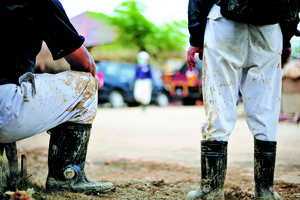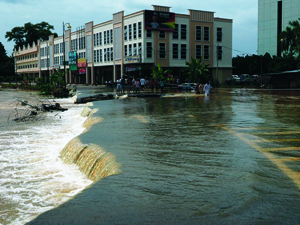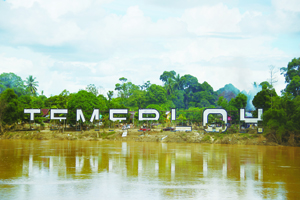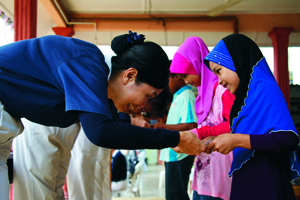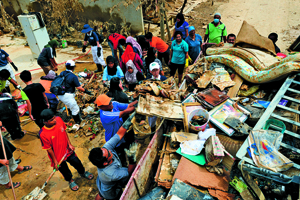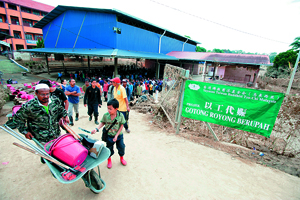

| From Muddy Mess to Clean Solid Ground | ||||||||||||||||||
| By Gan Chian Nee Translated by Tang Yau-yang | ||||||||||||||||||
The rainy season in Malaysia runs from November to March, during which time the Northeast Monsoon brings abundant rain to the east coast states of Peninsular Malaysia. Residents there are prepared for heavy rains during this season, but they were not prepared enough for the deluge this year—the rains that came in December 2014 led to the worst floods in 30 years. Hundreds of thousands of people in nine states were affected. The states of Kelantan, Terengganu, and Pahang were hit the hardest. In the aftermath of the flooding, residents were stuck with thick mud and debris that the water had left behind. It would be daunting for anyone to clean it up alone. A Tzu Chi cash-for-work program brought neighbors together, and with their combined strength the path to recovery has been made much easier.
Pahang is the largest state in Peninsular Malaysia, and the third largest in the country. The 270-mile Pahang River, the longest in the peninsula, flows through the state, where 1.5 million people live. The river is a major source of economic activity in the region, helping to sustain a fishing industry and boost tourism. Unfortunately, this river floods almost every year. Flooding in low-lying areas is especially commonplace. Residents along its banks are accustomed to the situation and have largely adapted their lives to it. But in December 2014, heavy rains brought floods unlike any before. Floodwaters, instead of receding normally, continued to rise because of high tides due to a full moon. This wave of floods affected 260,000 people throughout Malaysia, 120,000 of which lived along the river. The disaster prompted the Malaysian Ministry of Education to postpone for a week the opening of all primary and secondary schools, which were originally slated to open on January 4, 2015. Tzu Chi volunteers in the nation decided to focus on the especially hard-hit states of Pahang and Kelantan. They set out on December 26 and 27 from Penang and Kuala Lumpur to assess the damage. When they arrived, they found so much water everywhere it was difficult to tell whether solid ground or a ditch was underneath the water. It was quite dangerous to wade in the water, so they went about their mission in small boats. They took special caution to prevent their boats from being overturned. After the visits, they were in no mood to welcome the New Year. Instead, they worked through the holiday to help flood victims. Cash-for-work program Temerloh is a town with a large Malay population that sits near the Pahang River. Many people there operate fish farms along the river. In good times, the river is a lifeline for many families; in bad times like this, it brings them misery. During this flood, Temerloh was submerged for nearly a week; more than 15,300 residents were affected. On December 27, Tzu Chi volunteers visited the area to appraise the situation. Commercial districts and residential neighborhoods alike were under water, and volunteers had to take boats to get around. More volunteers followed this initial group into the town. While they continued to assess damage, they also distributed relief goods. At the peak of the disaster, 260,000 people in Malaysia were affected. Tzu Chi volunteers inspected the situation, carried out relief distributions, and provided free medical services in different areas. During this time, they found that the best way to help communities return to normal would be to initiate cash-for-work programs to clear the mud, damaged furniture, and debris from the affected neighborhoods. They set to work on it, but before such programs could be started, a few hurdles had to be overcome. Muslims account for more than 60 percent of the nation’s population. Though Tzu Chi has always helped people in need without regard to their religion, ethnicity, or any other considerations, it is nonetheless a Buddhist organization by name. They had to address this issue before anything else. Therefore, volunteers worked with village heads and councilmen to iron out issues, and they made the community leaders feel comfortable in supporting the initiative.
While distributing goods in Temerloh, volunteers heard that a fellow volunteer in Kuala Krau, 45 minutes away by car, was also a victim of the floods. They decided to take some time to visit her. When they arrived, they discovered that about 600 families there had been severely affected by the floods. No aid had yet arrived. Kuala Krau became one of the areas in which volunteers started a cash-for-work project. The project kicked off on January 4, 2015. Volunteers had anticipated that a thousand people might turn out for work, but a mere two hundred showed up. They pressed ahead all the same. “Let’s go into people’s homes and help them move out damaged furniture,” said volunteer David Liu (劉濟雨), who coordinated the cleanup work. “Then we’ll use excavators and trucks to clear the garbage from the neighborhoods. As soon as the homes and the roads are clean, life will return to the community.” Liu also urged volunteers to take the opportunity to talk to residents and encourage them to join the program. Volunteers worked in teams of ten. Whenever they saw local residents cleaning up, they helped them out and told them about the program. Some people thought that the program was too good to be true—they found it hard to believe that they would get paid for cleaning up their own homes and community. Others went to the designated spot to sign up and started to work. True enough, they each got a hundred ringgits (US$28) at the end of the workday. On the second day, more than 800 people signed up. The floods had caused many workplaces to shut down, so many people were temporarily out of work. The money they received from the project came in handy.
Regaining vitality The three-day cash-for-work program ended on a high note, but the cleanup was not completed. Therefore, volunteers returned to Kuala Krau on January 10 to extend the program one more day. On January 11, they also conducted a large-scale relief distribution at a local school, where daily necessities, folding beds, and blankets were given out to flood victims. A free clinic was held at the same time. After four days of the cash-for-work program, which logged more than 2,600 person-times, Kuala Krau was transformed. Mountains of garbage, large furniture dragged from houses, and tons of mud had been cleared out. The streets were restored almost to their usual condition and were no longer hard to negotiate. Many stores, which had been closed since the flood, opened their doors, and many owners and workers were going through their inventories of goods to determine what to keep and what to toss. Even street vendors were back in business. Families could be seen busily cleaning up the inside and outside of their homes. Yeong Kam Lin (楊金蓮), 64, is the sole Tzu Chi commissioner in Kuala Krau. “We had all thought that the mud and garbage would be very hard to clear,” she said. “But everyone’s combined efforts really made a big difference. People really pitched in during the four days of the cash-for-work program.” Ramlah bt. Mamat, 62, lives in a corner of the village that is easy for people to overlook. All of her belongings were flooded. She had been worried that help would never reach her home. Just when she was feeling the most distressed, she saw Tzu Chi volunteers come into her village to inspect the damage and help clean up. They listened to her pour out her anguish. Grateful for the help the volunteers rendered to the village, she repeatedly told the volunteers that she would invite them back to her home when she had made it more presentable. In addition to leading the cleanup work, volunteers also visited household after household to identify people who needed help. Immediately after, they began preparing for a distribution of cash aid so that flood victims could buy new furniture and necessities.
Schools Many schools suffered heavy damage in the flood. Some schools could not replace desks, chairs, and books soon enough to meet the government-mandated start date for a new term. Besides, some of the teachers, staff, and students at the schools were flood victims themselves. Those schools were forced to delay opening by another week. Schools needed cleaning just as badly as the homes and streets did, but there were only so many hands to go around. School principals and teachers were therefore at their wits’ end. Tzu Chi volunteers rushed to help so that children could return to school as soon as possible.
SMA Darul Naim is a good example of how Tzu Chi helped local schools. Located in a low-lying area, the school had seen its share of flooding in the 52 years since its founding, but the worst they had ever experienced was waist-high water. That record was easily shattered in this deluge, when floodwaters reached as high as the second floor. Imam Roslan Awang Mohamad pointed out that the flood had come when the school was on break. Though he lived closest to the school, the deluge had prevented him from going there. When the water finally receded, he was the first on the scene. His heart sank when he saw the mud all over the campus. He rounded up 30 relatives and friends to clean up. They worked a whole day and managed to clean an area that measured 150 square meters (180 square yards). They were totally exhausted. Just then the imam got word that a non-profit named Tzu Chi would come the following day to help them. His heart lifted. Sharifah Fazura bt. Syed Omar, an 11-year veteran teacher at the school, said, “When I saw the horrible sights in the school after the ravages of the flood, I thought we would have to close. There was no way we could muster enough help to restore the school.” As soon as she heard about the cash-for-work program, she told everybody about it and urged alumni, family, and friends to sign up. The imam said, “It was like people sinking in a river: They waved their arms for help, and Tzu Chi offered a helping hand and pulled them up just in time.” What moved him the most was seeing the volunteers sincerely and willingly putting in the time to help. “Where there is suffering, there are Tzu Chi volunteers,” he added. After the cleanup, watermarks everywhere at the school still vividly reminded everyone of this horrible flood. But the campus was no longer covered in mud, and people could once again walk on solid ground. The school was ready to serve its students again.
“On behalf of my fellow residents in Kelantan, I wanted to thank all my fellow volunteers,” said Ho Ji Yuan (何濟淵), a Tzu Chi volunteer. “I felt really helpless when this huge calamity hit us. Thank you for giving us so much help.” Ho had volunteered in the Philippines after Typhoon Haiyan, so he had witnessed the marvelous effectiveness of cash-for-work programs in quickly returning disaster zones to some degree of normalcy. Now a similar program was being implemented in his home state, where many places, things, and people were so familiar to him. That proximity was tangling up his emotions. Ho had been impressed by many people. “Businesses loaned us tools for cleaning and motor scooters to help us move about. Two hotels even provided space for Tzu Chi to set up coordination headquarters,” he said. “A mosque allowed us to cook on their premises, and they led prayers after the cleanup. Some people declined the cash after they had worked all day. There is love everywhere.” Although this natural disaster led to distress and suffering, people helping people, disregarding the barriers of religion and ethnicity, stirred up expanding ripples of love. People have been brought closer together by the warmth of mutual help. |













|

